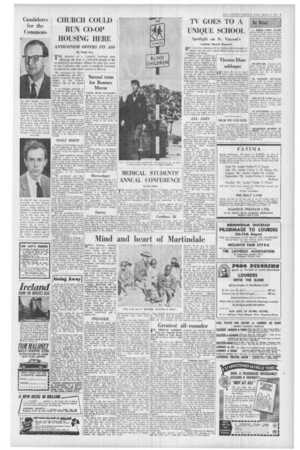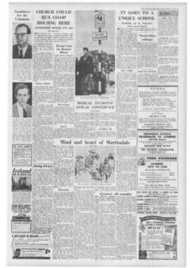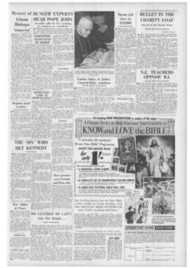Page 5, 22nd March 1963
Page 5

Report an error
Noticed an error on this page?If you've noticed an error in this article please click here to report it.
Tags
Share
Related articles
Father Of Catholic Radio Dies
Stranded In Denmark, Fr. Martindale Keeps Writing
A 'rale Of Two Priests
Fr. Martindale: Anxiety
The Law Of Fasting
Mind and heart of Martindale
SINCE Monday morning, when news of Fr. Martindale's death was released, tributes to his memory have been pouring in from men and women in all walks of life. from the loftiest to the humblest, and from many parts of the world.
Few men contributed as much as Fr. Martindale to the pioneering work of Michael de la Bedoyere, former editor of the CATHOLIC HERALD, Who launched a new era in Catholic journalism through this paper.
Today, MICHAEL DE IA BEDOVERE pays this special tribute to his close friend and collaborator of half a lifetime:—
For the CATHOLIC HERALD the death of Father Martindale is a personal and intimate loss.
Ever since the paper, in its present form and under its present ownership, started its work more than 25 years ago, Father Martindale has been a constant contributor and a unique one.
PIONEER
He felt that this paper had pioneered a contemporary Catholic press which emphasised the aspects of Catholicism which all through his long life had been dear to him: the Catholic apostolate in language that people of today can understand; a liturgy based on the Mystical Body and the supernatural life that people of today can understand; and an international view of the Church's work.
In the early days, few issues of the paper appeared without articles or letters by Fr. Martindale. For
the paper he made a new translation of the Sunday liturgy for all
the Sundays of the year. His bril liant, down-to-earth, "modern" hagiographical insight gave us a long series "What are Saints" in which week by week, the lives of the saints were retold in terms understandable by the modern mind.
And hardly a week passed without the letter page having his sig nature appended to a letter, more often than not, on some aspect of liturgical reform. Most of what has since been established or pro
jected was foreseen by Fr. Martindale under the two liturgical
essentials: the corporate nature of Catholic worship and the consequent need for a worship intelligible to all.
In view of the fact that Fr. Martindale's Oxford career broke
every record of scholastic attain
ment, it may be asked how his dedication and drive came to ex press itself in books like "Jack, Jock and the Corporal" or "Alfred Albert, P.C."
The reason was, quite simply, that souls were to him infinitely more important than scholarship or fame. One has . heard this criticised more than once, for souls can be looked after by every priest, but only a Martindale could win for the Church in this country the authority and in
lluence that brains and learning of the highest order alone make possible.
To take this view, however, is to forget that Fr. Martindale was no ordinary apostle. Somehow he had the gift of spontaneous friendship with any and every kind of man. This rare, delicate, refined human being was as much friend to navvy, docker, miner, common soldier, the down-and-out as the elegant, supercilious undergraduate, the cynical intellectual or the odd actor. One suspected, however, that he was only really happy and at home with the former, most of all during the first war with the invalided soldiers in Oxford — Jack, Jock and the Corporal.
This lifelong quest for souls and how many there must have been who have owed their spiritual lives to this extraordinary apostle — enabled him to see and think in terms of raw untutored minds and express Catholic teaching, without any intellectual slumming, in popular. but brilliant books.
His mind went straight to the mark, with whomsoever he might be—and it so went because it was driven by an intense love and understanding. Nor was this as paradoxical as it might seem, The essence of Fr. Martindale, whether in scholarship, scripture, devotion, liturgy, apologetics or in his immense variety of human relations was always to go straight to the relevant point. His mind seemed like a chisel which cuts away the unessential to leave only the significant and essential. In this, despite a certain outward forbiddingness, there was an astonishing humility.
The same incisiveness and directness of spirit was shown in broadcast talks which he did brilliantly. It was a thousand pities that in later years no one seemed to bother to recall Fr. Martindale to the microphone, for few, if any, could have bettered him even in his old age. Flow wonderful he would have been on a TV BrainsTrust.
Many thought that when in 1940 Fr. Martindale went to Copenhagen to find himself interned there by the Germans for the
blog comments powered by Disqus











